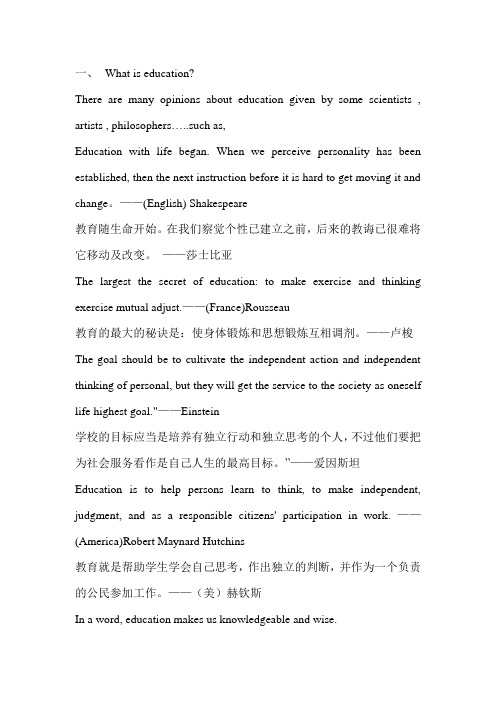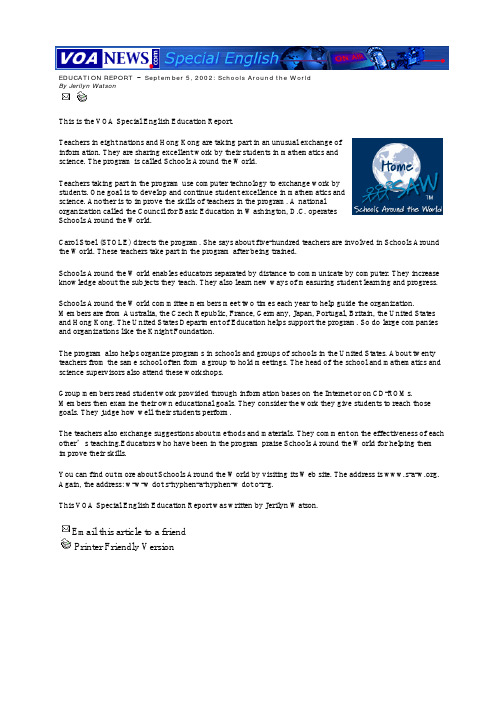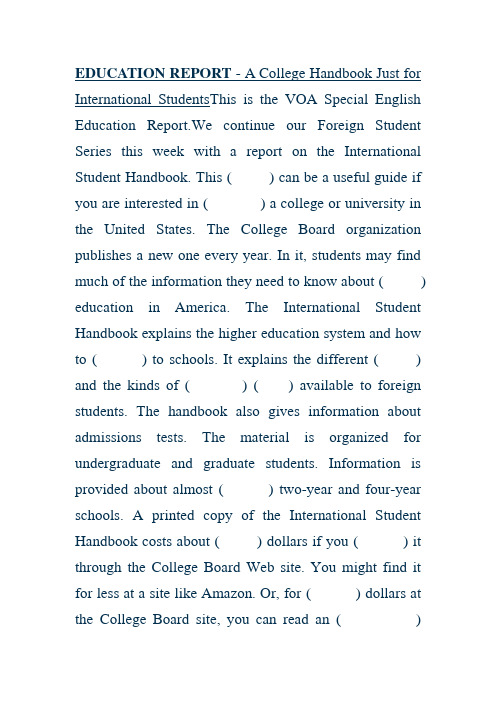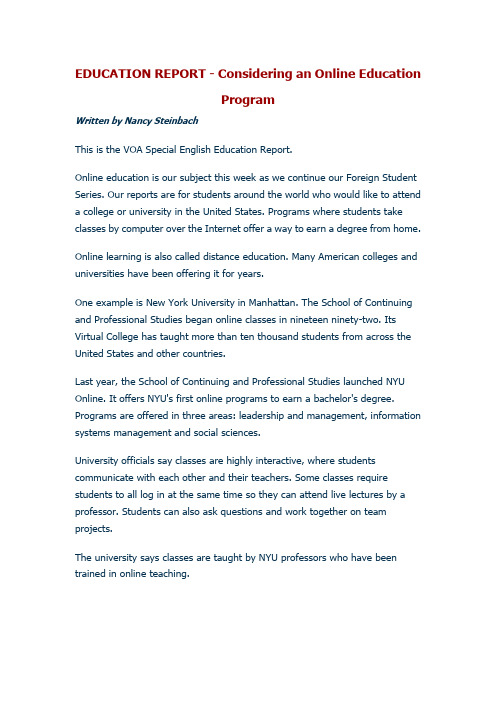EDUCATION REPORT - Commission Finds Poor Writing in U.S. Schools
- 格式:pdf
- 大小:20.35 KB
- 文档页数:1

Title: A Survey Report on Educational InternshipIntroduction:Educational internship is a valuable opportunity for students to gain practical experience in the field of education. This survey report aims to explore the experiences and perceptions of students who have undergone educational internships. The report is based on a sample size of 100 students from various educational institutions in China.Objectives:The main objectives of this survey are to:1. Understand the benefits and challenges faced by students during their educational internships.2. Identify the key skills and qualities acquired by students through internships.3. Explore the impact of internships on students' career aspirations and decision to pursue a career in education.Methodology:The survey was conducted using a structured questionnaire consisting of multiple-choice questions and open-ended questions. The questionnaire covered various aspects such as the overall experience of the internship, the role of the supervisor, the learning outcomes, and the challenges faced by students. Data collected from the survey was analyzed using descriptive statistics.Findings:The majority of the students surveyed reported a positive overall experience of their educational internships. They felt that internships provided them with valuable practical experience that cannot be gained through theoretical studies alone. The internships also helped them to develop important skills such as classroom management, lesson planning, and communication with students and parents.However, students also highlighted several challenges they faced during their internships. The most common challenge was the fear of making mistakes and the pressure to perform well. Some students also faced difficulties in adapting to the school environment and handlingdisciplinary issues. Despite these challenges, the majority of students agreed that the benefits of internships outweighed the challenges.The survey results also showed that students acquired various skills and qualities through their internships. The top skills mentioned were classroom management, lesson planning, and discipline management. Students also developed qualities such as patience, adaptability, and problem-solving skills.When asked about the impact of internships on their career aspirations, a significant majority of students said that the internships reinforced their decision to pursue a career in education. They felt that the practical experience provided them with a clearer understanding of the teaching profession and helped them to identify their strengths and areas for improvement.Conclusion:Educational internships play a crucial role in preparing students for a career in education. The survey results indicate that internships provide valuable practical experience, help students develop important skills and qualities, and reinforce their decision to pursue a career in education. However, it is important to address the challenges faced by students during internships to ensure a more positive and effective learning experience.Recommendations:Based on the survey findings, the following recommendations can be made:1. Provide better support and guidance to students during their internships.2. Offer training programs to help students develop necessary skills and qualities.3. Enhance the mentorship program to provide students with more guidance and feedback.4. Continuously evaluate and improve the internship program to ensureits effectiveness in preparing students for a career in education.Overall, educational internships are an essential component of teacher education and should be continued and improved upon in the future.。

一、What is education?There are many opinions about education given by some scientists , artists , philosophers…..such as,Education with life began. When we perceive personality has been established, then the next instruction before it is hard to get moving it and change。
——(English) Shakespeare教育随生命开始。
在我们察觉个性已建立之前,后来的教诲已很难将它移动及改变。
——莎士比亚The largest the secret of education: to make exercise and thinking exercise mutual adjust.——(France)Rousseau教育的最大的秘诀是:使身体锻炼和思想锻炼互相调剂。
——卢梭The goal should be to cultivate the independent action and independent thinking of personal, but they will get the service to the society as oneself life highest goal."——Einstein学校的目标应当是培养有独立行动和独立思考的个人,不过他们要把为社会服务看作是自己人生的最高目标。
”——爱因斯坦Education is to help persons learn to think, to make independent, judgment, and as a responsible citizens' participation in work. ——(America)Robert Maynard Hutchins教育就是帮助学生学会自己思考,作出独立的判断,并作为一个负责的公民参加工作。

EDUCATION REPORT – September 5, 2002: Schools Around the WorldBy Jerilyn WatsonThis is the VOA Special English Education Report.Teachers in eight nations and Hong Kong are taking part in an unusual exchange ofinformation. They are sharing excellent work by their students in mathematics andscience. The program is called Schools Around the World.Teachers taking part in the program use computer technology to exchange work bystudents. One goal is to develop and continue student excellence in mathematics andscience. Another is to improve the skills of teachers in the program. A nationalorganization called the Council for Basic Education in Washington, D.C. operatesSchools Around the World.Carol Stoel (STOLE) directs the program. She says about five-hundred teachers are involved in Schools Around the World. These teachers take part in the program after being trained.Schools Around the World enables educators separated by distance to communicate by computer. They increase knowledge about the subjects they teach. They also learn new ways of measuring student learning and progress.Schools Around the World committee members meet two times each year to help guide the organization. Members are from Australia, the Czech Republic, France, Germany, Japan, Portugal, Britain, the United States and Hong Kong. The United States Department of Education helps support the program. So do large companies and organizations like the Knight Foundation.The program also helps organize programs in schools and groups of schools in the United States. About twenty teachers from the same school often form a group to hold meetings. The head of the school and mathematics and science supervisors also attend these workshops.Group members read student work provided through information bases on the Internet or on CD-ROMs. Members then examine their own educational goals. They consider the work they give students to reach those goals. They judge how well their students perform.The teachers also exchange suggestions about methods and materials. They comment on the effectiveness of each other’s cators who have been in the program praise Schools Around the World for helping them improve their skills.You can find out more about Schools Around the World by visiting its Web site. The address is . Again, the address: w-w-w dot s-hyphen-a-hyphen-w dot o-r-g.This VOA Special English Education Report was written by Jerilyn Watson.Email this article to a friendPrinter Friendly Version。

最新2021年度全球国际学生教育调查报告The latest global international student education survey report 2021汇报人:JinTai College最新2021年度全球国际学生教育调查报告前言:调查报告是反映对某个问题、某个事件或某方面情况调查研究所获得的成果的文章。
调查报告是宣传唯物论和辩证法、坚持实事求是思想路线的有力武器,历来被无产阶级革命家所重视。
本文档根据调查报告内容要求展开说明,具有实践指导意义,便于学习和使用,本文档下载后内容可按需编辑修改及打印。
近日,全球高校学生教育调查权威评测机构i-graduate 公布了XX年全球范围内国际学生教育调查报告。
新西兰xxx 学院在全球国际学生晴雨表(the international student barometer™,下文中缩写为isb)中多项指数获得满分,在全球高等教育发展和竞争市场中亮剑。
i-graduate通过问卷形式对全球高校学生的在校学习经历、住宿服务、学生服务、抵校服务四个板块共计75个分项进行了调查。
在综合总评分中,新西兰xxx学院获得了97.3%的高分,高于全球平均得分87.3%和新西兰平均得分87.5%,对该校十年的求索和发展给予了充分的肯定。
isb报告显示,在学习经历下属的22个分项中,新西兰xxx学院有9项获得100%的满分,其它均在90%以上,学生学习经历综合评分为97.4%,领先该项全球平均值10.1%,高于新西兰平均值9.8%,充分显示了该校在模拟学习、学习辅导、硬件支持、在线图书馆、优良师资、课程安排、高质量讲座等方面为留学生提供了优质的服务。
在住宿服务方面,该校获得95.3%的平均成绩,高于全球平均得分83.2%,同时高出新西兰教育平均得分12.5%,在优良的居住环境、安全、良好的沟通、校园环境、奖学金支持等方面为留学生提供了可靠的保障。
i-graduate对寄宿家庭服务、各类信息咨询、职业规划、学生组织等12个小项的综合考评得出了该校学生服务的得分,10个小项获得100%使高校获得了平均得分为99.4%的高分,而此项全球平均值仅为91.1%,新西兰平均值为91.5%.接送学生服务、欢迎仪式、注册、协助办理银行卡、交通卡等优异的日常服务让该校在抵校服务综合获得96.8%的高分,高于全球平均值87.9%和新西兰平均值89.5%。

EDUCATION REPORT - A College Handbook Just for International StudentsThis is the VOA Special English Education Report.We continue our Foreign Student Series this week with a report on the International Student Handbook. This ( ) can be a useful guide if you are interested in ( ) a college or university in the United States. The College Board organization publishes a new one every year. In it, students may find much of the information they need to know about ( ) education in America. The International Student Handbook explains the higher education system and how to ( ) to schools. It explains the different ( ) and the kinds of ( ) ( ) available to foreign students. The handbook also gives information about admissions tests. The material is organized for undergraduate and graduate students. Information is provided about almost ( ) two-year and four-year schools. A printed copy of the International Student Handbook costs about ( ) dollars if you ( ) it through the College Board Web site. You might find it for less at a site like Amazon. Or, for ( ) dollars at the College Board site, you can read an ()version and print out a copy. The online handbook also includes links to more information. The Web site is ( ).com. We began our Foreign Student Series in September. So far, we have explored the American higher education system and government rules for coming to the United States. We have also talked about ( ) tests, the costs of an education and the different kinds of financial aid available. Some of our reports have been based on questions from our listeners. We welcome questions, and are happy to see all the interest in our series. But please understand that we can only answer ( ) questions. We cannot tell you how to get into the school of your choice or what you should study to be prepared. All we can do is suggest that students who are interested in a school should carefully read its Web site or ( ) materials. Then send an e-mail or letter to the ( ) office with any questions you have. There may also be a special office for international students.And that's the VOA Special English Education Report, written by Nancy Steinbach. Send your questions to special@. And remember to include your name and country. Our series continues next week, andall of the earlier reports can be found with transcripts and MP3 files at . I'm Steve Ember.。

EDUCATION REPORT - Considering an Online EducationProgramWritten by Nancy SteinbachThis is the VOA Special English Education Report.Online education is our subject this week as we continue our Foreign Student Series. Our reports are for students around the world who would like to attend a college or university in the United States. Programs where students take classes by computer over the Internet offer a way to earn a degree from home.Online learning is also called distance education. Many American colleges and universities have been offering it for years.One example is New York University in Manhattan. The School of Continuing and Professional Studies began online classes in nineteen ninety-two. Its Virtual College has taught more than ten thousand students from across the United States and other countries.Last year, the School of Continuing and Professional Studies launched NYU Online. It offers NYU's first online programs to earn a bachelor's degree. Programs are offered in three areas: leadership and management, information systems management and social sciences.University officials say classes are highly interactive, where students communicate with each other and their teachers. Some classes require students to all log in at the same time so they can attend live lectures by a professor. Students can also ask questions and work together on team projects.The university says classes are taught by NYU professors who have been trained in online teaching.International students must take two admissions tests before they can be accepted into the program. These are the SAT and the TOEFL. We will discuss these tests later in our series.The cost to attend NYU Online depends on how many classes a student takes. It can cost as much as fifteen thousand dollars a year. NYU offers no financial aid for international students in this program. You can get more details at .Many other schools offer online education. Students should be especially careful of programs that offer a degree in return for little or no work. These are known as diploma mills, and are illegal in the United States.Educational advisers also say that before you enter any program, make sure the work will be recognized in your country. You should also make sure the schools you are considering are accredited. That will be our subject next week.And that's the VOA Special English Education Report, written by Nancy Steinbach. More information for foreign students can be found at. I'm Steve Ember.。
EDUCA TION REPORT - Foreign Student Series # 1 >IntroductionBy Nancy SteinbachThis is the VOA Special English EDUCA TION REPORT.This week, we are starting a series of EDUCATION REPORTS about how people from foreign countries can attend college in the United States.We have done this before on the Special English program AMERICAN MOSAIC. The last series was broadcast two years ago. Since then, we have received many letters about American higher education and how foreign students can take part. So we decided to offer new reports that contain the latest information. The series will begin next week.Each week, the EDUCATION REPORT will discuss a part of the process of becoming an international student in the United States. Each report also will be on the Special English Web site at w-w-w dot voaspecialenglish dot com.Foreign students who want to study in the United States have many questions. Some of these include: How do I find out about American colleges? How do I choose the right one for me? What tests must I take? What kinds of official documents will I need? How much will it cost? We will answer these kinds of questions in our reports.We will discuss the American system of higher education. We will tell about financial aid. We will describe rules concerning foreign students who want to work while studying. We will explain the English language requirement. We will discuss required tests. We will tell how to prepare for them. And we will tell you where to find help in your own country.Some of the programs will tell about a few of the three-thousand colleges and universities in the United States. These reports will discuss study programs that may interest you. We will tell about living at an American college. We also will explain about ways to use a computer to study at an American university without leaving home. And we will discuss how the terrorist attacks last year have changed some of the rules for foreign students in the United States.To prepare these reports, we talked to government officials, foreign students and university officials in different parts of the country. Most students say planning ahead helped make their American educational experience successful. That is the purpose of this series - to help you plan. Our reports about attending college in the United States begin next week.This VOA Special English EDUCATION REPORT was written by Nancy Steinbach.Questions:1.What is the series of reports about?2.Why and when will the series begin?3.What will each week’s report discuss?4.What will they discuss generally?5.Whom did we talk to to prepare these reports?6.What is the purpose of this series?。
EDUCATION REPORT - Choosing Between a College or a University Written by Nancy Steinbach This is the VOA Special English Education Report. What is the difference between a college and a university? This is the subject of part three in our series for students who want to attend a college or university in the United States. Colleges and universities have many things in common. Both provide a greater understanding of the world and its past. Both provide education in the arts and sciences. And both can helpprepare young people to earn a living. Students who complete their undergraduate studies either at a four-year college or a university receive a bachelor's degree. One difference is that many colleges do not offer graduate studies. Universities are generally bigger, offer more programs and do more research.Modern universities developed from those of the Middle Ages in Europe. The word "university" came from the Latin "universitas." Thisdescribed a group of people organized for a common purpose. The word "college" came from a Latin word with a similar meaning, "collegium." In England, colleges were formed to provide students with places to live. Usually each group was studying the same thing. So college came to mean an area of study.But a college can also be a part of a university. The first American universities divided their studies into a number of areas and called each one a college. This is still true. Programs in higher learning may also be called schools. The University of Arizona in Tucson, for example, has eighteen colleges and ten schools. They include the colleges of pharmacy, education, engineering and law. They also include the schools of architecture, dance and public administration. College is also used as a general term for higher education. A news report might talk about "college students" even if they include students at universities. Or someone might ask, "Where do you go to college?"Today, most American colleges offer an area of study called liberal arts. These are subjects first developed and taught in ancient Greece. They include language, philosophy and mathematics. The purpose was to train a person's mind insteadof teaching job skills.And that's the VOA Special English Education Report, written by Nancy Steinbach. Our Foreign Student Series continues next week with a report aboutonline education. You can find our reports at . And international students can learn more about higher education in the United States at . I'm Steve Ember.。
EDUCATION REPORT - Learning Disabilities, IntroductionWe begin a series of programs about learning disabilities. These are disorders in the ways that people understand or use language. They can affect the ability to listen or think, or to speak, or to read and write. They can also affect the ability to do mathematics.A person with a learning disability has unusual difficulty in developing these skills. Researchers believe that learning disabilities are caused by differences in the way that the brain works with information. They say children with learning disabilities are not unintelligent or do not want to work. Their brains just process information differently than other people.Researchers say that as many as one out of every five people in the United States has some kind of learning disability. Almost three-million children in the United States receive some kind of help in school for a learning disability.How can you tell if someone has a learning disability? Experts look for a difference between how well a child does in school and the level of intelligence or ability of the child. But there is no one sign of a disorder.A few signs of a learning disability include not connecting letters with their sounds or not understanding what is read. A person with a learning disability may not be able to understand a funny story. They may not follow directions. They may not read numbers correctly or know how to start a task. Different people have different kinds of learning disabilities. One person may have trouble understanding mathematics. Another may have difficulty understanding what people are saying. Still another may not be able to express ideas in writing.These different kinds of learning disabilities are known by different names. For example, a person who has difficulty reading may have dyslexia. Someone who cannot do mathematics may have a disorder called dyscalculia.Experts say learning disabilities cannot be cured. But people who have them can be helped. Teachers and parents can help young people with learning disabilities to learn successfully.In the next few weeks, we will discuss different kinds of learning disabilities. We will provide advice from specialists about ways to deal with them. And we will also examine some of the political issues involved in the area of special education.1。
教育行业报告英文The Education Industry Report。
Introduction。
The education industry plays a crucial role in shaping the future of individuals and societies. It encompasses a wide range of institutions and organizations, including schools, colleges, universities, training centers, and educational technology companies. In this report, we will examine the current state of the education industry, including key trends, challenges, and opportunities.Key Trends in the Education Industry。
1. Technology Integration。
One of the most significant trends in the education industry is the integration of technology into teaching and learning. With the rise of digital devices and online platforms, educators are increasingly using technology to deliver content, engage students, and assess learning outcomes. This trend has been accelerated by the COVID-19 pandemic, which forced many educational institutions to adopt remote learning and digital tools.2. Personalized Learning。
EDUCATION REPORT - June 12, 2003: Commission Finds Poor Writing in U.S. Schools
By Cynthia Kirk
This is the VOA Special English Education Report.
A report by educators in the United States says students in American schools and colleges need to write better. The National Commission on Writing in America’s Schools and Colleges produced the report. The commission includes university leaders, public school officials, teachers and writing experts. A private organization, the College Board, established the commission.
The report says writing helps people think more clearly and is necessary for educational and professional success. But it says many schools are not giving enough attention to writing. It says students are getting fewer writing projects from their teachers. Many teachers say they have too many students and not enough time to grade their work.
The commission found that most fourth-grade students spend less than three hours a week writing. It says they spend many more hours watching television.
It says about two-thirds of the nation’s twelfth-grade students write a three-page paper less often than once a month in their English classes. And seventy-five percent of high school seniors never receive a writing project in history or social studies classes.
Further, recent studies found that more than fifty-percent of students in their first year of college could not put together information well enough to be communicated clearly to someone else. And the report said most of the writing contained language mistakes.
Twenty years ago, the government released a report about problems in the educational system in the United States. A reform movement followed, but most efforts were put into teaching reading and math.
Experts say that is changing now, because employers and teachers are deeply concerned about the writing skills of American students.
Programs are increasing throughout the nation to aid teachers. And both of the major college-entrance tests, the S-A-T and the A-C-T, are being changed to include writing tests.
The commission’s report is to be followed by a five-year campaign led by former Senator Bob Kerrey to put its suggestions into effect. The campaign will urge lawmakers and educators to increase writing programs in schools. The commission also calls on educators and businesses to work together to develop technology to help teach writing and measure writing quality.
This VOA Special English Education Report was written by Cynthia Kirk.
Email this article to a friend
Printer Friendly Version。